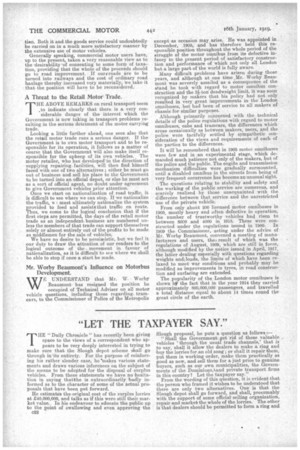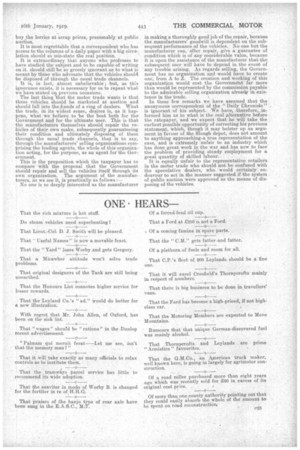"LET THE TAXPAYER SAY."
Page 2

Page 3

If you've noticed an error in this article please click here to report it so we can fix it.
THE "Daily Chronicle" has recently been giving space to the views of a correspondent who appears to be very deeply interested in trying to make sure that the Slough depot scheme shall go through inits entirety. For the purpose of reinforcing his rather slender case, he *makes various statements and draws various inferences on the subject of the means to be adopted for the disposal of surplus vehicles. From these statements we have no hesitation in saying thatthe is extraordinarily badly informed as to the character of some of the actual proposals that have been put forward. He estimates the•original cast of the surplus lorries at £40,000,000, and talks as if this were still their market value. In his endeavour to educate the, public up to the point of swallowing and even approving the
c22
Slough proposal, he puts a question as follows:—
" Shall the Government get rid of these valuable vehicles 'through the usual trade channels,' that is to say, shall it allow the dealers to make a ring and buy the lorries for an old song'; or shall it repair them, put them in working order, make them practically as good as new, and sell them for a just price to genuine 'buyers, such as our own municipalities, the Governments of the Dominions,i,and private transport firms in this country ? Let the taxpayer say."
From the wording of this question, it is evident that the person who framed it wishes to be understood that there are only two alternatives. One is that the Slough depot shall go forward, and shall, presumably with the support of some official selling organization, repair 'and market the whole of the lorries. The other is that dealers should be permitted to form a, ring and buy the lorries at scrap prices, presumably at public auction.
It is most regrettable that a correspondent who has access to the columns of a daily paper with a big circulation should sO mis-state the real position. It is extraordinary that anyone who professes to have studied the subject and to be capable of writing on it, should still be so grossly ignorant as to what is meant by those who advocate that the vehicles should be disposed of through the usual trade channels. It is, in fact, almost unbelievable ; but, as this ignorance exists, it is necessary for us to repeat what we have stated o previous occasions. The last thing that the motor trade Wants is that these vehicles should be marketed at auction and should fall into thekands of a ring of dealers. What the trade, in its widest sense, desires is as it happens, what we believe to be the best both for the Government and for the ultimate user. This is that the manufacturers themselves should repair the vehicles of their own make, subsequently guaranteeing their condition and ultimately disposing of them through the usual trade channels, that is to say, through the manufacturers' selling organizations comprising the leading agents, the whole of this organization acting, for the purpose, as an agent for-the Government.
This is the proposition which the taxpayer has to compare with the proposal that the Government should repair and sell the vehicles itself through its own organization. The argument of the manufacturers, as we see it, is practically as follows : No one is so deeply interested ELS the manufacturer in making a thoroughly good job of the repair, because the manufacturers' goodwill is dependent on the subsequent performance of the vehicles. No one but the manufacturer can, after repair, give a guarantee of condition which is of any considerable value, because it is upon the assistance of the manufacturer that the subsequent user will have to depend in the event of any trouble arising. As regards selling, the Government has no organization and would have to create one, from A to Z. The creation and working of this organization would cost the Government far more than would be represented by the commission payable to the admirable selling organization alreadf in existence in the trade.
In these few remarks we have assumed that the anonymous correspondent of the "Daily Chronicle" is ignorant of his subject. We have therefore, .informed him as to what is the real alternative before the ratepayer, and we expect that he will take the earliest possible opportunity of correcting his previous statement, which, though it may bolster up an argument in favour of the Slough depot, does not amount to anything approaching.a true representation of the case, and is extremely unfair to an industry which has done great work in the war and has now to face the problem of providing steady employment for a great quantity of skilled labour. It is equally unfair to the representative retailers in the motor trade who should not be confused with the speculative dealers, who would certainly endeavour to act in the manner suggested if the system of public auction were approved as the means of disposing of the vehicles.






















